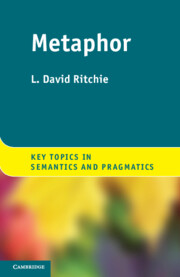Book contents
- Frontmatter
- Contents
- Figures
- Acknowledgments
- 1 Introduction
- 2 Understanding metaphors
- 3 Categorization and relevance
- 4 Conceptual metaphors
- 5 Perceptual simulation
- 6 Metaphors and framing effects
- 7 Language play
- 8 Metaphors in conversation
- 9 Metaphors in politics
- 10 Metaphors in literature
- 11 Closing reflections
- Glossary
- Bibliography
- Index
5 - Perceptual simulation
Published online by Cambridge University Press: 05 February 2013
- Frontmatter
- Contents
- Figures
- Acknowledgments
- 1 Introduction
- 2 Understanding metaphors
- 3 Categorization and relevance
- 4 Conceptual metaphors
- 5 Perceptual simulation
- 6 Metaphors and framing effects
- 7 Language play
- 8 Metaphors in conversation
- 9 Metaphors in politics
- 10 Metaphors in literature
- 11 Closing reflections
- Glossary
- Bibliography
- Index
Summary
Romney’s vulture capitalist problem.
(Forbes online headline, January 12, 2012)Lakoff and Johnson (1980; 1999) claim that most concepts are fundamentally metaphorical, and that most verbal metaphors are expressions of underlying conceptual metaphors. According to CMT, ‘rising prices’ expresses the underlying conceptual metaphor more is up and ‘high status’ expresses the underlying metaphor important is up. Based on these assertions, Lakoff and Johnson claim that speaker and hearer actually experience both the price of a more expensive item and the position of a more prestigious person as physically higher in relation to a less expensive item or less prestigious person. Similarly, they claim that ‘a dead-end relationship’ expresses the underlying conceptual metaphor love is a journey, and speaker and hearer will experience the current state of the relationship in terms of impeded physical motion. According to CMT, basic conceptual metaphors are often combined to form compound metaphors. Thus, “vulture capitalism” is based on a combination of underlying metaphors that might be characterized as something like an enterprise is a living organism, failure is dying, and profiting from the failure of others is feeding on carrion.
A frequent criticism of CMT is that it remains unclear exactly what it means to experience an abstract concept as a physical entity; for example to experience an enterprise as an organism or to experience price, social status, or an unsatisfying relationship as physical states or motion in physical space. In this chapter I will discuss another theoretical approach, perceptual simulation theory, that helps to explain how we might experience an abstract concept (a metaphor topic) as a physical sensation related to a metaphor vehicle. I will also discuss some of the experimental evidence that supports both conceptual metaphor theory and perceptual simulation theory. At the end of the chapter I will propose an account of metaphor processing and understanding that integrates these ideas with several ideas from previous chapters.
- Type
- Chapter
- Information
- Metaphor , pp. 88 - 105Publisher: Cambridge University PressPrint publication year: 2013



